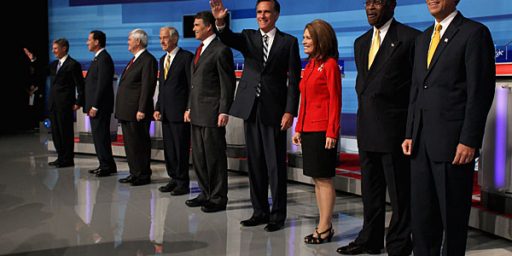Texas Appeals Court Tosses One Of Two Counts Against Rick Perry
A big win in Court for the former Texas Governor, but it's unclear what this means politically.
Just over a year ago, former Texas Governor Rick Perry was indicted by a special prosecutor on two charges related to his activities as Governor and his relationship with the District Attorney in Austin. The case against Perry revolves around a dispute between him and that District Attorney, whose duties including investigating and prosecuting crimes involves members of the Executive Branch. Among other things, the prosecutor’s office had been involved in investigating an economic promotion fund that Perry had jurisdiction which many of his critics claimed was being used as a slush fund to reward Perry loyalists. After the prosecutor was arrested on a DUI charge under circumstances where, to stay the least, bizarre given her behavior at the time of arrest, Perry said he would not sign the bill funding her office unless she resigned. At the time, many of Perry’s critics claimed that he was using the DUI charge as an excuse to get rid of a troublesome prosecutor. At it’s core, the indictment claimed that Perry used his veto power to extract something out of the prosecutors office improperly. As I’ve noted before, and as legal scholars on both sides of the aisle have said, the charges have been odd from the beginning given the fact that Texas’s Constitution gives the Governor an unlimited veto power. Despite those legal questions, efforts to get the case dismissed before trial have been unsuccessful. Most recently in January, the trial judge denied a Motion to Dismiss. Today, though, a Texas appellate court dismissed one of the counts against Perry and suggested strongly that the other count was legally dubious but could not be dismissed due to the procedural posture of the case:
Former Gov. Rick Perry of Texas, who is seeking the Republican nomination for president, received some good news regarding his legal problems on Friday when an appeals court in his state dropped one of the two felony charges he is facing.
Mr. Perry was indicted last summer on criminal charges of abuse of power and coercion of a public servant. The case surrounds an episode during which Mr. Perry was accused of trying to use his powers as governor to make an elected official step down after being charged with drunken driving.
The case has been a nuisance for Mr. Perry as he looks to gain traction in a crowded field of Republicans seeking the party’s presidential nomination.
On Friday, the Austin court dismissed the coercion of a public servant charge against Mr. Perry on the grounds that violates his right to free speech under the First Amendment.
“Because the First Amendment bars enforcement of the statute on which the “coercion of a public servant” charge is based, that charge must be dismissed,” Judge Bert Richardson wrote in an opinion.
The coercion charge would have carried a prison sentence of two to 10 years. Mr. Perry still faces the more serious abuse of official capacity charge, which carries a prison sentence of five to 99 years.
(…)
“The remaining charge is hanging by a thread, and we are confident that once it is put before the court, it will be dismissed on its face,” said Tony Buzbee, lead counsel for Mr. Perry.
Michael McCrum, the special prosecutor who has brought the case against Mr. Perry, was not immediately available to comment on the dismissal of the charge.
This isn’t the end of the road for Perry, of course. He still has one charge pending against him for “Abuse of Official Capacity,” which essentially alleges that he misused his veto power. As I’ve noted, though, the fact that the veto is Constitutionally unlimited makes any charge that it is being used improperly in the absence of evidence of bribery seem dubious at best. Indeed, the appellate court expressed skepticism about this charge but ultimately allowed to stand because it found that it did not have jurisdiction to consider the arguments that were raised at this stage of the case. While that language is obviously not legally binding, it is a strong indication that the previous criticisms of these charge have some merit and that Perry is likely to be vindicated at the end of this process.
This ruling from the Texas Court of Appeals could be appealed to the Texas Supreme Court for Criminal Appeals, but as is usually the case with appellate courts of last resort that court has discretion in deciding whether or not to accept the case for review. Barring that appeal, the matter would now return back to the trial court for further proceedings, including a potential trial on the remaining count. Obviously, even this limited win at the appellate level is a good news for Perry since it removes at least part of the indictment that has been hanging over his head since before he entered the race for President. In all honesty, though, it’s not apparent that this is an issue that has been hurting Perry very much in the race for the Republican nomination. None of his opponents have brought the issue up, and it hasn’t really been a topic of conversation during the media appearance that Perry has made that I have seen. Indeed, given the fact that the indictment is widely seen on the right as an example of a partisan abuse of power, you could make the argument that it has actually helped Perry to some extent regain some of the credibility he lost with the Republican base after the debacle of his 2012 campaign. That’s not say things are rosy for Perry, of course. He is under two percent in the RealClearPolitics poll average and right now would seem to just barely qualify for the August 6th Fox News debate. Perry has made some news lately as one of the most aggressive attackers of Donald Trump, but unless he makes that debate it’s unlikely his campaign his going to take off.
Here’s the opinion:







Woo-Hoo…he is only facing one felony charge now!!!
And one that has very little legal merit at that
Which is the same as proving the case to ungodly progressives.
If the Michael E Mann defamation case was such a slam dunk as ungodly progressives said, why hasn’t he won yet?
@Paul L.: Last I heard because the defendants keep appealing. You hearing something different in the RW echo chamber?
@Paul L.:
The key to making great hummus is peeling the chickpeas first. It can be time consuming, but if you have one of those old fashioned food mills, you can get it done in a jiffy.
(Just following Paul L’s lead of posting gibberish that has nothing to do with the article at hand.)
He does look much smarter with the nerd glasses.
Someone break out the tequila! Perry’s chances of becoming president just shot up from 0.0003% to 0.0049%!
So, I guess to all those that support this tactic, this makes Obama’s threat to veto the bill cutting off funding to sanctuary cities until amnesty is passed is equally illegal.
@Jack: I’m not sure what “tactic” “all those” would be accused of supporting, but I suppose the legality or illegality of Obama’s action would depend on Federal statutes and one’s understanding of the meaning of sovereign immunity, but I am not a lawyer, so I can’t go on to speculate further.